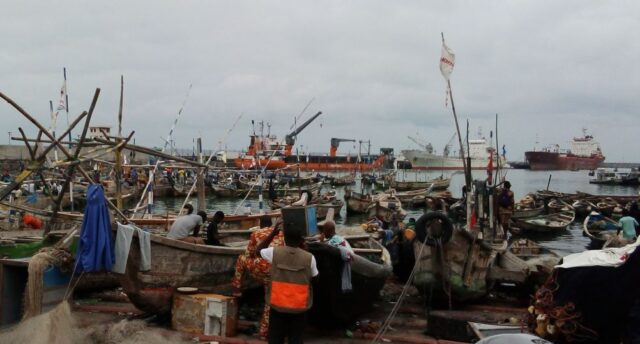Benin’s maritime waters are suffering from Illegal, Unreported and Unregulated (IUU) fishing, mostly by Chinese vessels. While efforts continue to be made to strengthen surveillance on the high seas, the economic losses remain enormous for a country whose revenue is mainly tax-based.
Approximately two billion CFA francs in losses caused annually by vessels involved in IUU fishing in Benin, mostly by Chinese vessels. This is approximately the hefty bill Benin is paying for the economic consequences of illegal fishing in Beninese maritime waters.
Indeed, Benin has a 121-kilometre-long coastline and a sea area representing 40% of its land area. Fishing contributes to 3% of the country’s gross domestic product (GDP) and feeds more than 600,000 people, according to the report of the framework survey of artisanal maritime fishing in Benin carried out in 2014. Benin’s waters are home to a fauna of more than 257 species of fish, in addition to crustacean species and others, according to information contained in the National Action Plan to prevent and eliminate illegal fishing. The exploitable potential of fish is estimated at 12,000 tonnes per year, according to the National Inventory for the Collection of Data on Fishing in Benin. The latest estimate is more than 74,000 tonnes of fish, according to the Directorate of Fisheries (Dph).
Despite this potential, the security of maritime waters is still far from being effective. As a result, Benin’s fisheries resources are illegally exploited by vessels on the high seas, as confirmed by the Maritime Prefect, Captain Maxime Fernand Ahoyo: “Our resources are being plundered because of our absence on the high seas. The Maritime Prefect is the national authority in charge of the State’s action at sea. In recent years, he has boarded many vessels guilty of several offences including fishing in prohibited areas, catching prohibited species, poor hygiene conditions, fishing without authorisation or without a licence.
Chinese ships in the firing line: The new sea pirates…
According to the NGO Eco-Benin, between 2019 and 2020, more than 10 trawlers were boarded by the Beninese authorities with the support of Sea Shepherd. While the NGO does not give any indication of the origin of the vessels boarded, other sources identify them.
For the Maritime Prefect, from 2015 to 2022, some fifteen vessels were boarded in Benin as part of the fight against illegal fishing. From the details provided, it appears that most of the vessels boarded have Chinese equipment.
According to the Financial Transparency Coalition (FTC) report, of the top 10 companies involved in illegal fishing, 8 are of Chinese origin. When contacted, Alfonso Daniels, author of the report, said that Chinese vessels have been identified in Beninese waters, but the report does not say exactly how many Chinese vessels are involved in Beninese waters.
Socialter, in a 2021 publication, reports that following an operation in Beninese waters, “5 vessels, all Chinese” were arrested.
Chinese vessels are undoubtedly the main threat to the sustainable management of fish stocks, including in Beninese waters.
Factors favouring illegal fishing in Benin: From “very attractive” sanctions to logistical and material difficulties…
The first factor is material and logistical. Indeed, it is only recently that Benin has acquired a deep-sea patrol boat. This is thanks to an equipment programme by the national navy. “Since its creation, the national navy has only had coastal patrol boats. Our operational capacities do not allow us to leave the territorial waters to go to the high seas, that is to say, up to 22 km into the sea,” admits Maxime Ahoyo.
After many months of trials, the patrol boat, which is now operational, is still not available to reinforce the fight against IUU fishing. According to well-informed sources, the patrol boat has been assigned to another mission. This 50-metre deep-sea patrol vessel and an accompanying launch will be able to stay on the high seas for a fortnight, says Maxime Ahoyo.
The solution found in response to the lack of a patrol boat was to sign a memorandum of understanding in April 2019 with the NGO Sea Shepherd. The latter provides Benin with a 50-metre vessel with a marine gunner to go up to 200 km from the coast. However, this vessel will remain in Benin for a maximum of three weeks before moving on to another partner country. This means that outside the period of the vessel’s stay, Benin’s maritime waters seem to be little or not monitored at all.
While in May 2022 Benin signed a memorandum of understanding with Global Fishing Watch to obtain reliable information on activities in the exclusive economic zone for intervention, it is to be hoped that the new patrol vessel will soon be operational for such interventions.
In addition to logistical problems, the second factor that encourages illegal fishing is the weakness of the sanctions, which do not dissuade it. The sanctions seem rather “attractive”, deplores the maritime prefect, Maxime Ahoyo. “The penalties are not heavy enough to slow down the momentum of these offenders,” says Herman Gangbazo, Head of the Fisheries Development and Management Department at the Directorate of Fisheries and Fisheries Production (DPH).
They say that vessels boarded and brought to court are fined between 2 and 3 million FCFA. These vessels that have been boarded and brought to justice have been given sentences and fines that are considered “derisory”. However, in the same period another vessel was boarded in Ghana and paid about 600 million FCFA. In fact, according to the penal provisions of the framework law, the maximum sentence of imprisonment is one year, while the maximum fine does not exceed 25 million FCFA, with the possibility of an amicable settlement. Whereas in Ghana, the ceiling is 1.5 billion dollars, says Maxime Ahoyo. He reassured that the review process of the said framework law would start.
The lack of political will to fight the phenomenon remains an important factor. Although the Beninese authorities are aware of the impact of illegal fishing on the national economy as well as on local fishermen, measures to strengthen the fight are still weak.
Benin has recently acquired VMS (Vessels monitoring system) stations, thanks to the support of the CPCO, to monitor vessels in real time. However, monitoring is limited to authorised vessels that are obliged to carry beacons on board during fishing activities. The perpetrators of illegal fishing are not concerned and are informed of the few control operations. “The day before an operation, there was a general movement of vessels out of Beninese waters during the time the Sea Shepherd vessel was on the high seas. Curiously, once the Sea Shepherd vessel was on the Beninese coast, there was also a general movement of vessels returning to Beninese waters,” said the maritime prefect.
Another factor is the lack of transparency of ship inspection missions. According to our investigations, ship inspection missions are carried out by the owners of the ships. This does not guarantee the independence and credibility of inspection and control reports.
Similarly, once licences have been granted, the fisheries administration has no mechanism for monitoring and controlling fishing activities.
The huge economic losses
How much can we estimate the economic losses of Benin linked to illegal fishing? The bill remains high for the loss of earnings or economic losses linked to illegal fishing in Beninese maritime waters. But the Beninese authorities do not have reliable data on illegal fishing in Benin. Even the Directorate of Fisheries admits that it has no data to quantify the economic losses. In this situation of poor documentation, it is impossible to evaluate the economic losses, says Maxime Ahoyo, maritime prefect.
But while Matti Kohonen of the Financial Transparency coalition confirms this, he points out that the economic losses from illegal fishing could be “equivalent to legal fishing as in other countries”. What is the contribution of legal fishing?
In recent years, the revenue from legal fishing is estimated at nearly 2 billion FCFA, according to Brito Urbain, Head of the Control and Monitoring of Fishery Products and Post-Capture Department, who has now been promoted to Director of Fisheries Production. On the basis of this estimate, Benin’s economic losses caused by illegal fishing could well be estimated at around 2 billion FCFA each year, while revenue from vessel licences is estimated at around 500 million FCFA annually, even though this has been falling in recent years. They would have fallen to 104 million CFA francs in 2021 and 90 million CFA francs in 2022. These are huge losses that could have helped the government to build more school and health infrastructure to ensure better access to education and health care.
Frame
Illegal fishing causes Africa to lose an estimated 100,000 tonnes of fish each year
According to the Financial Transparency Coalition (FTC) in its report published on 26 October 2022, Africa loses about 100,000 tonnes of fish each year to illegal fishing. It is the third most lucrative natural resource crime after timber and mining, the report said, lamenting the lack of information on the real owners of these vessels who often use shell companies, front companies and joint ventures to conceal their identity.
Economic losses from illegal fishing are estimated at 1.9 billion dollars per year in the Gulf of Guinea. But according to the Financial Transparency Coalition’s report published on 26 October 2022, the losses are more worrying.
This assertion is shared by the report “Fishy networks: uncovering the companies and individuals behind illegal fishing worldwide”, for which the 195 vessels operating illegally in West Africa (i.e. 40.2%) generate losses estimated at 9.4 billion USD.
“This article was written by Aziz Badarou as part of “The Wealth of Nations”, a pan-African media skills development programme run by the Thomson Reuters Foundation.
More information on http://www.wealth-of-nations.org/fr/ .
The Thomson Reuters Foundation is not responsible for the content published, which is the sole responsibility of the publishers.
Illegal fishing = Unreported and Unregulated (IUU) fishing










